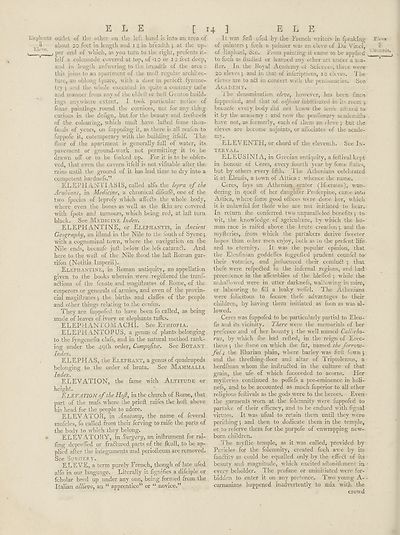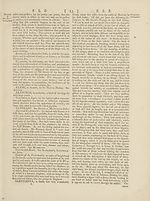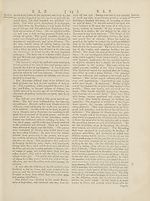Encyclopaedia Britannica, or, a Dictionary of arts, sciences, and miscellaneous literature : enlarged and improved. Illustrated with nearly six hundred engravings > Volume 8, ELE-FOR
(26) Page 14
Download files
Complete book:
Individual page:
Thumbnail gallery: Grid view | List view

Eleve
E L E [i
Elephanta oUclet of the other on the left hand is into an area of
about 20 feet in length and i 2 in breadth ; at the up-
j per end of which, as you turn to the right, prefents it-
felf a colonnade covered at top, of -io or 12 feet deep,
and in length anfwering to the breadth of the area :
this joins to an apartment of the moft regular architec¬
ture, an oblong fquare, with a door in perfect fymme-
try j and the whole executed in quite a contrary tafte
and manner from any of the oldeft or beft Gcntoo build¬
ings anywhere extant. I took particular notice of
feme paintings round the cornices, not for any thing
curious in the dengn, but for the beauty and frefhnefs
of the colouring, which mull have lafted fome thou-
fands of years, on fuppoiing it, as there is all realon to
fuppofe it, cotemporary with the building itfelf. The
door of the apartment is generally full of water, its
pavement or ground-work not permitting it to be
drawn off or to be foaked up. For it is to be obfer-
ved, that even the cavern itfelf is not viii table after the
rains until the ground of it has had time to dry into a
competent hardnefs.”
ELEPHANT! A.SIS, called alfo the Zqora of the
Arabians, in Medicine, a chronical difeafe, one of the
two fpecies of leprofy which affects the whole body,
where even the bones as well as the fkin are covered
with fpots and tumours, which being red, at laft turn
black. See Medicine Index.
ELEPHANTINE, or Elephantis, in Ancient
Geography, an ifland in the Nile to the fouth of Syenej
with a cognominal town, where the navigation on the
Nile ends, becaufe juft below the lefs catarafl. And
here to the weft of the Nile flood the laft Roman gar-
rifon (Notitia Imperii).
Elephantine, in Roman antiquity, an appellation
given to the books wherein were regiftered the tranf-
a cl ions of the fenate and magiftrates of Rome, of the
emperors or generals of armies, and even of the provin¬
cial magiftrates 5 the births and claffes of the people
and other things relating to the cenfus.
They are fuppofed to have been fo called, as being
made of leaves of ivory or elephants tulks.
ELEPHANTOMACHI. See Ethiopia.
ELEPH ANTOPUS, a genus of plants belonging
to the fyngenefta clafs, and in the natural method rank¬
ing under the 49'ih order, Compofitce. See Botany
Index.
ELEPHAS, the Elephant, a genus of quadrupeds
belonging to the order of bruta. See Mammalia
Index.
ELEVATION, the fame with Altitude or
height.
ELEVATION of the Hof, in the church of Rome, that
part of the mafs where the prieft raifes the hoft above
lus head for the people to adore.
ELEVATOR, in Anatomy, the name of feveral
mufcles, fo called from their ferving to raife the parts of
the body to which they belong.
ELEVATORY, in Surgery, an inftrument for rai¬
ling depreffed or fraftured parts of the Ikull, to be ap¬
plied after the integuments and periofteum are removed.
See Surgery.
ELEVE, a term purely French, though of late ufed
alfo in our language. Literally it fignifies a difciple or
fcholar bred up under any one, being formed from the
Italian aliievo, an “ apprentice” or “ novice.”
4 ] E L E
It was firft ufed by the French writers in Leaking Ek-vs
of painters j fuch a painter was an eleve of Da Vinci, , li
of Raphael, &c. From painting it came to be applied ,'
to fuch as ftudied or learned any other art under a ma¬
iler. In the Royal Academy oi Sciences, there were
20 eleves 5 and in that of inferiptions, 10 eleves. The
eleves are to aid in concert with the penhonaries. See
Academy.
The denomination e/cve, however, has been fince
fuppreiied, and that of adjoint mbftiiuted in its room j,
beeauie eveiy' body did not know the lenle attixtd to
it by the academy : and now the penfionary academifts
have not, as formerly, each of them an deve ; but the
eleves are become adjoints, or aflbeiates of the acade¬
my.
ELEVENTH, or chord of the eleventh. See In¬
terval.
ELEUSINIA, in Grecian antiquity, a feftival kept
in honour of Ceres, every fourth year by fome ft ales,
but by others every fifth. The Athenians celebrated
it at Eleuiis, a town of Attica : whence the name.
Ceres, fays an Athenian orator (Ifocrates), wan¬
dering in queft of her daughter Proferpine, came into
Attica, where fome good offices were done her, which
it is unlawful for thole who are not initiated to hear.
In return Ihe conferred two unparalleled benefits ; to
wit, the knowledge of agriculture, by which the hu¬
man race is raifed above the brute crealion 5 and the-
myfteries, from which the partakers derive fweeter
hopes than other men enjoy, bolh as to the prefent life
and to eternity. It was the popular opinion, that
the Eleufiman goddefles liiggefted prudent eounfel to
their votaries, and influenced their conduft ; that
thefe were relpefted m the infernal regions, and had
precedence in the affemblies of the bleffed •, while the
unhallowed were in utter darknefs, wallowing in mire,
or labouring to fill a leaky veffel. The Athenians
were folieitous to fecure thefe advantages to their
children, by having them initiated as foon as was al¬
lowed.
Ceres was fuppofed to be particularly partial to Eleu-
fis and its vicinity. There were the memorials of her
prefence and of her bounty ; the well named Callicho-
rus, by which the had refted, in the reign of Erec-
theus 5 the ftone on which ihe fat, named the forrow-
ful; the Rharian plain, where barley was firft fown j
and the threftiing-tloor and altar of Triptolemus, a
herdfman whom Ihe initructed in the culture of that
grain, the ufe of which fucceeded to acorns. Tier
myfteries continued to poffefs a pre-eminence in holi-
nefs, and to be accounted as much fuperior to all other
religious feftivals as the gods were to the heroes. Even
the garments worn at the folemnity were fuppofed to
partake of their efficacy, and to be endued with fignal
virtues. It was ufual to retain them until they were
periihing} and then to dedicate them in the temple,
or to referve them for the purpofe of enwrapping newr-
born children.
The myftic temple, as it ivas called, provided by
Pericles for the folemnity, created fuch a we by its
fanclily as could be equalled only by the effccl of its
beauty and magnitude, which excited aftonilhment in
every beholder * The profane or uninitiated were for¬
bidden to enter it on any pretence. Two young A- -
carnanians happened inadvertently to mix with the
crowd
E L E [i
Elephanta oUclet of the other on the left hand is into an area of
about 20 feet in length and i 2 in breadth ; at the up-
j per end of which, as you turn to the right, prefents it-
felf a colonnade covered at top, of -io or 12 feet deep,
and in length anfwering to the breadth of the area :
this joins to an apartment of the moft regular architec¬
ture, an oblong fquare, with a door in perfect fymme-
try j and the whole executed in quite a contrary tafte
and manner from any of the oldeft or beft Gcntoo build¬
ings anywhere extant. I took particular notice of
feme paintings round the cornices, not for any thing
curious in the dengn, but for the beauty and frefhnefs
of the colouring, which mull have lafted fome thou-
fands of years, on fuppoiing it, as there is all realon to
fuppofe it, cotemporary with the building itfelf. The
door of the apartment is generally full of water, its
pavement or ground-work not permitting it to be
drawn off or to be foaked up. For it is to be obfer-
ved, that even the cavern itfelf is not viii table after the
rains until the ground of it has had time to dry into a
competent hardnefs.”
ELEPHANT! A.SIS, called alfo the Zqora of the
Arabians, in Medicine, a chronical difeafe, one of the
two fpecies of leprofy which affects the whole body,
where even the bones as well as the fkin are covered
with fpots and tumours, which being red, at laft turn
black. See Medicine Index.
ELEPHANTINE, or Elephantis, in Ancient
Geography, an ifland in the Nile to the fouth of Syenej
with a cognominal town, where the navigation on the
Nile ends, becaufe juft below the lefs catarafl. And
here to the weft of the Nile flood the laft Roman gar-
rifon (Notitia Imperii).
Elephantine, in Roman antiquity, an appellation
given to the books wherein were regiftered the tranf-
a cl ions of the fenate and magiftrates of Rome, of the
emperors or generals of armies, and even of the provin¬
cial magiftrates 5 the births and claffes of the people
and other things relating to the cenfus.
They are fuppofed to have been fo called, as being
made of leaves of ivory or elephants tulks.
ELEPHANTOMACHI. See Ethiopia.
ELEPH ANTOPUS, a genus of plants belonging
to the fyngenefta clafs, and in the natural method rank¬
ing under the 49'ih order, Compofitce. See Botany
Index.
ELEPHAS, the Elephant, a genus of quadrupeds
belonging to the order of bruta. See Mammalia
Index.
ELEVATION, the fame with Altitude or
height.
ELEVATION of the Hof, in the church of Rome, that
part of the mafs where the prieft raifes the hoft above
lus head for the people to adore.
ELEVATOR, in Anatomy, the name of feveral
mufcles, fo called from their ferving to raife the parts of
the body to which they belong.
ELEVATORY, in Surgery, an inftrument for rai¬
ling depreffed or fraftured parts of the Ikull, to be ap¬
plied after the integuments and periofteum are removed.
See Surgery.
ELEVE, a term purely French, though of late ufed
alfo in our language. Literally it fignifies a difciple or
fcholar bred up under any one, being formed from the
Italian aliievo, an “ apprentice” or “ novice.”
4 ] E L E
It was firft ufed by the French writers in Leaking Ek-vs
of painters j fuch a painter was an eleve of Da Vinci, , li
of Raphael, &c. From painting it came to be applied ,'
to fuch as ftudied or learned any other art under a ma¬
iler. In the Royal Academy oi Sciences, there were
20 eleves 5 and in that of inferiptions, 10 eleves. The
eleves are to aid in concert with the penhonaries. See
Academy.
The denomination e/cve, however, has been fince
fuppreiied, and that of adjoint mbftiiuted in its room j,
beeauie eveiy' body did not know the lenle attixtd to
it by the academy : and now the penfionary academifts
have not, as formerly, each of them an deve ; but the
eleves are become adjoints, or aflbeiates of the acade¬
my.
ELEVENTH, or chord of the eleventh. See In¬
terval.
ELEUSINIA, in Grecian antiquity, a feftival kept
in honour of Ceres, every fourth year by fome ft ales,
but by others every fifth. The Athenians celebrated
it at Eleuiis, a town of Attica : whence the name.
Ceres, fays an Athenian orator (Ifocrates), wan¬
dering in queft of her daughter Proferpine, came into
Attica, where fome good offices were done her, which
it is unlawful for thole who are not initiated to hear.
In return Ihe conferred two unparalleled benefits ; to
wit, the knowledge of agriculture, by which the hu¬
man race is raifed above the brute crealion 5 and the-
myfteries, from which the partakers derive fweeter
hopes than other men enjoy, bolh as to the prefent life
and to eternity. It was the popular opinion, that
the Eleufiman goddefles liiggefted prudent eounfel to
their votaries, and influenced their conduft ; that
thefe were relpefted m the infernal regions, and had
precedence in the affemblies of the bleffed •, while the
unhallowed were in utter darknefs, wallowing in mire,
or labouring to fill a leaky veffel. The Athenians
were folieitous to fecure thefe advantages to their
children, by having them initiated as foon as was al¬
lowed.
Ceres was fuppofed to be particularly partial to Eleu-
fis and its vicinity. There were the memorials of her
prefence and of her bounty ; the well named Callicho-
rus, by which the had refted, in the reign of Erec-
theus 5 the ftone on which ihe fat, named the forrow-
ful; the Rharian plain, where barley was firft fown j
and the threftiing-tloor and altar of Triptolemus, a
herdfman whom Ihe initructed in the culture of that
grain, the ufe of which fucceeded to acorns. Tier
myfteries continued to poffefs a pre-eminence in holi-
nefs, and to be accounted as much fuperior to all other
religious feftivals as the gods were to the heroes. Even
the garments worn at the folemnity were fuppofed to
partake of their efficacy, and to be endued with fignal
virtues. It was ufual to retain them until they were
periihing} and then to dedicate them in the temple,
or to referve them for the purpofe of enwrapping newr-
born children.
The myftic temple, as it ivas called, provided by
Pericles for the folemnity, created fuch a we by its
fanclily as could be equalled only by the effccl of its
beauty and magnitude, which excited aftonilhment in
every beholder * The profane or uninitiated were for¬
bidden to enter it on any pretence. Two young A- -
carnanians happened inadvertently to mix with the
crowd
Set display mode to:
![]() Universal Viewer |
Universal Viewer | ![]() Mirador |
Large image | Transcription
Mirador |
Large image | Transcription
Images and transcriptions on this page, including medium image downloads, may be used under the Creative Commons Attribution 4.0 International Licence unless otherwise stated. ![]()
| Permanent URL | https://digital.nls.uk/192263757 |
|---|
| Attribution and copyright: |
|
|---|
| Description | Ten editions of 'Encyclopaedia Britannica', issued from 1768-1903, in 231 volumes. Originally issued in 100 weekly parts (3 volumes) between 1768 and 1771 by publishers: Colin Macfarquhar and Andrew Bell (Edinburgh); editor: William Smellie: engraver: Andrew Bell. Expanded editions in the 19th century featured more volumes and contributions from leading experts in their fields. Managed and published in Edinburgh up to the 9th edition (25 volumes, from 1875-1889); the 10th edition (1902-1903) re-issued the 9th edition, with 11 supplementary volumes. |
|---|---|
| Additional NLS resources: |
|

